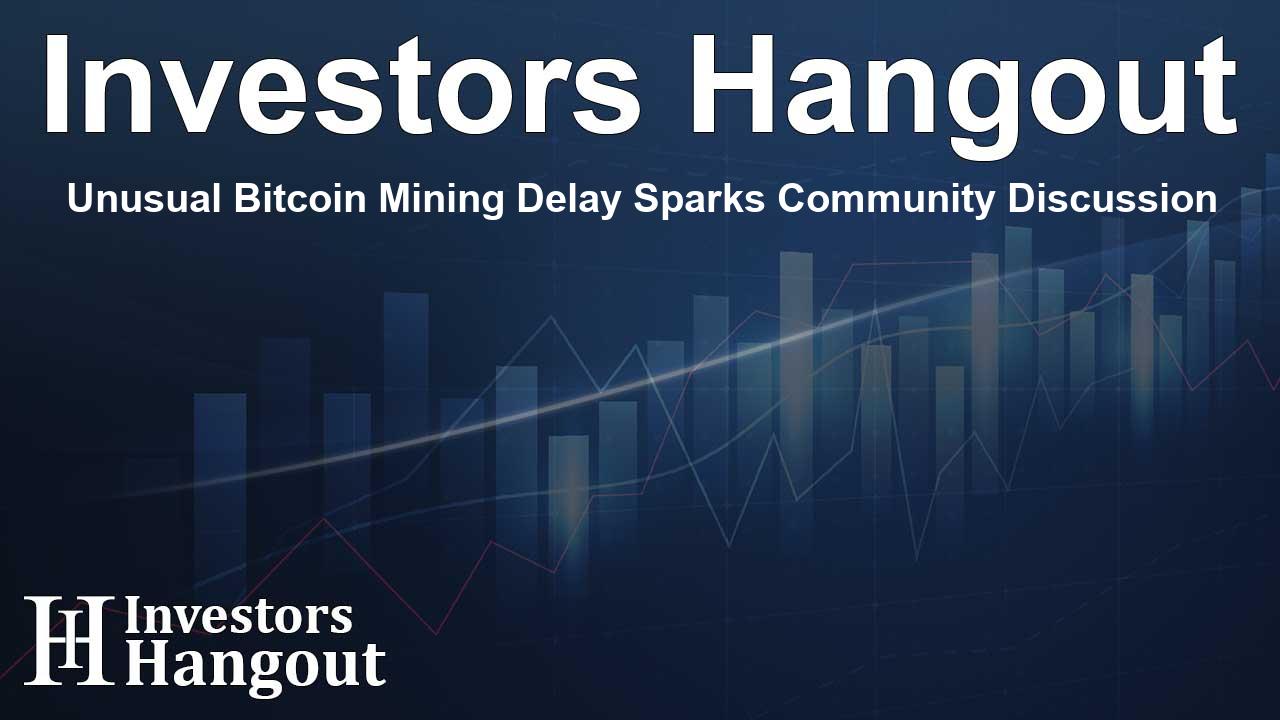Unusual Bitcoin Mining Delay Sparks Community Discussion

Understanding the Bitcoin Mining Delay
A recent event on the Bitcoin network has stirred conversation among cryptocurrency enthusiasts. It was reported that a block took over an hour to be mined, which deviates from the typical expectation. Normally, each block on the Bitcoin network is expected to take about 10 minutes to be added. However, this anomaly has raised intriguing questions.
Details of the Anomaly
The specific block in question, identified as 860081, took a staggering 73 minutes to add to the Bitcoin public ledger. This delay occurred due to network conditions and was produced by SECPOOL. The previous block, 860080, was generated by Marathon Digital at an earlier timestamp, highlighting a strange pause in the mining process.
Historical Context of Mining Delays
Longer confirmations aren't unheard of on the Bitcoin network. For perspective, another block took over an hour in November, while a block in April 2021 was delayed more than two hours. The longest known delay dates back to October 2011, when a block verification took an impressive 141 minutes.
The Importance of Block Confirmation Times
Maintaining a consistent block confirmation time is crucial for the network's stability. To regulate this, Bitcoin adjusts its mining difficulty approximately every two weeks, ensuring that blocks confirm roughly every 10 minutes. Nevertheless, variations naturally occur, contributing to the ongoing discussion within the community.
Expert Insights on Block Timing
Tadge Dryja, a co-inventor of the Lightning Network, shed light on these delays, indicating that an 85-minute gap can be expected roughly every 34 days under stable conditions. Such insights help contextualize these anomalies within the broader landscape of Bitcoin mining.
Current Bitcoin Market Activity
As of now, Bitcoin's trading price stands at $56,343.52, reflecting a slight decrease of 0.93% over the past day. These fluctuations in price can often fuel conversations about mining activities and overall network health.
Implications for the Cryptocurrency Community
The Bitcoin community continues to monitor these developments closely. Understanding the factors contributing to longer mining times helps users adapt and prepare for potential future occurrences. It’s a reminder that while the technology driving cryptocurrencies is advanced, it remains subject to peculiarities and variances.
Frequently Asked Questions
1. What does it mean when a Bitcoin block takes longer to mine?
It indicates that the network is encountering issues that delay the processing of transactions, affecting confirmation times.
2. How often does Bitcoin adjust its mining difficulty?
Bitcoin adjusts its mining difficulty approximately every two weeks, ensuring block confirmation time stays around 10 minutes.
3. Has Bitcoin experienced longer mining delays before?
Yes, instances of longer mining delays have occurred historically, such as in November 2023 and in April 2021.
4. What is the role of mining pools like SECPOOL?
Mining pools combine resources from multiple miners to increase their chances of successfully mining blocks and receiving rewards.
5. How does the price of Bitcoin relate to mining activities?
Bitcoin's price can influence mining operations; lower prices might discourage mining, while higher prices can stimulate investment in mining activities.
About Investors Hangout
Investors Hangout is a leading online stock forum for financial discussion and learning, offering a wide range of free tools and resources. It draws in traders of all levels, who exchange market knowledge, investigate trading tactics, and keep an eye on industry developments in real time. Featuring financial articles, stock message boards, quotes, charts, company profiles, and live news updates. Through cooperative learning and a wealth of informational resources, it helps users from novices creating their first portfolios to experts honing their techniques. Join Investors Hangout today: https://investorshangout.com/
Disclaimer: The content of this article is solely for general informational purposes only; it does not represent legal, financial, or investment advice. Investors Hangout does not offer financial advice; the author is not a licensed financial advisor. Consult a qualified advisor before making any financial or investment decisions based on this article. The author's interpretation of publicly available data shapes the opinions presented here; as a result, they should not be taken as advice to purchase, sell, or hold any securities mentioned or any other investments. The author does not guarantee the accuracy, completeness, or timeliness of any material, providing it "as is." Information and market conditions may change; past performance is not indicative of future outcomes. If any of the material offered here is inaccurate, please contact us for corrections.